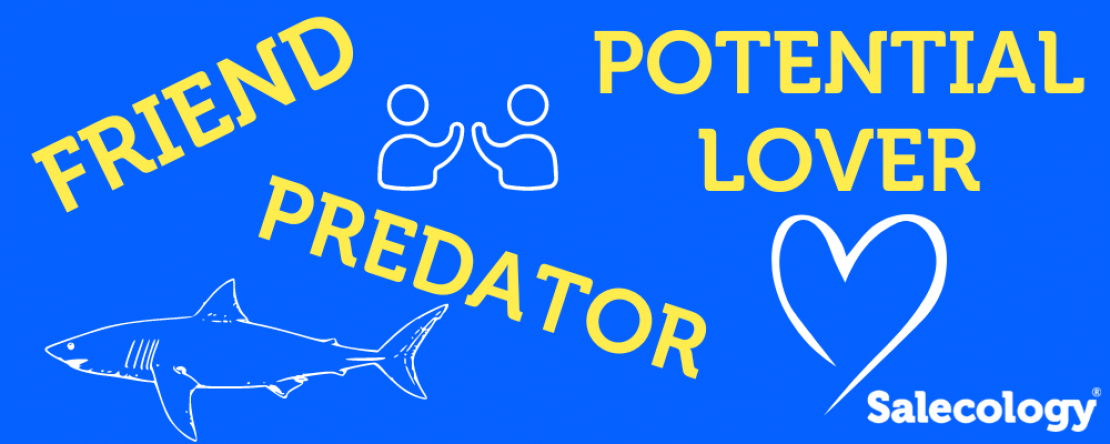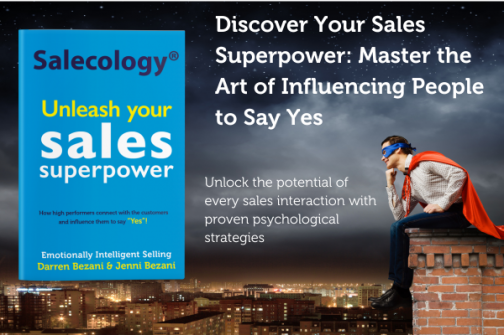
Friend, Predator or Potential Lover
Whenever you meet someone for the first time the brain takes the minimum amount of data and looks to decide whether they are:
- Friend – Is this person good for me? Something about them makes me warm to them and I tend to move towards them.
- Predator – Is this person bad for me? Something about them makes me wary and I tend to back away from them.
- Potential Lover – Remember I am talking about the primitive part of our brain here, and it is totally subconscious, but something might trigger this!
- Indifferent – I physically see you but nothing gets triggered. You are totally indifferent to me.
The majority of these decisions are made instantly on the first of your senses – visual. How you look, how you’re groomed, dressed, shoes, etc. all play a part, and then it’s combined with your body language, what I see and how it looks to me. Then the flood of all your other senses kicks in, such as what you hear i.e. what is said and more importantly how it is said.
Other senses get triggered as well including smell, which can have a positive or negative impact, and of course, the infamous greeting which can prove awkward. Let’s take the simple handshake which often tells us a lot about a person. But in different societies, the handshake can mean different things, for example in China the strength of the grip needs to be light, whereas in Germany it needs to be strong. In Morocco you finish the handshake off by putting the back of your hand to the back of theirs or in Rwanda you are more than likely to grab their forearm instead of the hand.
The first aspect of the middle part of your brain, often referred to as the reptilian brain, is where all the sensory data is received by the thalamus and distributed to other parts of your brain for deciphering. As it forwards on the data it sends a quick pulse to the amygdala which controls that fight-or-flight response. It is here that determines that Friend or Foe response.
As we have advanced a few million years, we are less conscious of this fight-or-flight response and this primitive part of our brain is not triggered so often, unless of course, something comes our way such as a salesperson trying to sell me something. Does it invoke a predator-type response or are you open to engaging as you think they are more friend? Or do you engage because you need to buy something but are on guard and will keep your barriers up to defend yourself against any attacks?
I have often asked people what they do when they know a salesperson is coming to call. They have invited the salesperson to visit, for example, a window glazing salesperson is coming to measure and quote for new windows. Do they somehow – consciously, or otherwise – prepare to protect themselves against a pitch? Most respond that they do prepare themselves to ‘not allow the person to sell to them’ but rather just give a quote. They withhold data, do not allow the salesperson to get into the pitch or somehow try to tell them to go and measure and quote. In essence, keep them at arm’s length. Why do they do that? Well, they don’t want to be sold to, or they don’t want to be somehow pressured by the seller. It is a fight-or-flight response.
Rapport
To overcome this fight-or-flight response we need to talk about rapport and its importance in building connections with customers. Everyone wants rapport. Rapport is that feeling when two or more people are totally connected to one another. Think about when you meet someone for the first time, what’s the first thing that happens?
Usually, it is some form of question, like how are you? What do you do? Did you see the game at the weekend? Or you share stories or exchange knowledge and so on. Why do you do that? People ask this question to try and find something in common with one another and start to build rapport. Rapport is therefore that feeling of commonality and is the spark that brings people together.
Rapport can be started and built by a common interest like the industry you are both in, where you went to school, a sport you like, an area of the country you are familiar with, or simply something that interests or amuses you both. Rapport plays a big part in the whole sales cycle:
Prospecting – We can open opportunities with people as they are more willing to engage.
Discovery – People will divulge more sensitive information during the exploration stage of the sale.
Presenting solutions – People are more willing to listen and engage with sales presentations, and more susceptible to collaborate.
Gaining commitment – People are more empathetic in negotiations look for win-win outcomes and are more likely to say yes.
More Information and Content:
FREE DOWNLOAD: Write More Effective Emails
Learn how to engage your customers better in your emails by focusing on how they receive and interpret your messaging. Different personalities read things differently. This booklet will help you get more responses to your emails.
Click on the image to download (No name or email details are required).

GET THE BOOK:
More information on Building Rapport, and removing the PREDATOR fear, across the sales cycle can be found in the latest Salecology Book, Click the image below to take a look at the website.

